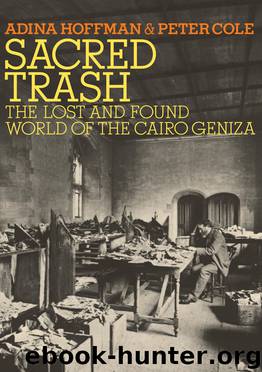Sacred Trash by Adina Hoffman

Author:Adina Hoffman [Hoffman, Adina]
Language: eng
Format: epub
ISBN: 978-0-8052-4290-4
Publisher: Knopf Doubleday Publishing Group
Published: 2011-04-04T16:00:00+00:00
(Photo Credit 8.1)
A similar reverence and desire for the authentic lay behind the intensified study of grammar among the Karaites, who believed that immersion in the intricacies and subtleties of biblical language would bring the reader closer to scripture’s meaning. God in this scenario was quite literally, and absolutely, in the details, and numerous Karaite works were therefore devoted to the study of scripture’s linguistic DNA—the nature and origins of language, the formation and precise definition of words, the structure of sentences, and so on. In the process, these Karaite scholars set the standard for future medieval biblical commentary—“shaming,” as it were, the rabbinic leadership into matching the intensity and manner of their engagement with Hebrew and its most important literary product. In this and so many other ways, on the broader cultural level Karaism acted as what Jacob Mann called “a leavening agent” and what later scholars—having much more evidence to go on—have come to think of as a central if stealth ingredient in the renaissance and virtual re-creation of Hebrew culture that swept across the Jewish world from Baghdad to Cairo to Cordoba and Granada between the tenth and twelfth centuries.
Back in the land of practice, distinctive Karaite religious rituals included—in addition to allowing the consumption of milk with meat, and forbidding the use of any light or heat on the Sabbath (and all expressions of joy in its arrival)—the refusal to observe postbiblical Jewish holidays such as Hanukka; the eschewal of the use of phylacteries and mezuzot; the rejection of rabbinic texts of any sort for use in the prayer book (which consisted solely of biblical passages, largely Psalms); and the forbidding of sexual intercourse on the Sabbath. The Karaites understood the latter to be “labor” while for the Rabbanites it was part of the day’s pleasure. In addition, the spilling of sperm was seen to cause impurity and to go against the biblical injunction of Exodus 34:21, “Six days thou shalt work, but on the seventh day thou shalt rest in plowing and in harvesting”!
One other seemingly innocuous but in fact nearly catastrophic difference between the Rabbanite and Karaite schools involved their contrasting methods of calendrical computation. While each party at times made use of the other’s technique, the divergent methods resulted in the Karaites and Rabbanites employing distinct religious schedules, so that, for example, the two communities observed Yom Kippur and all the major festivals on different days. This made for serious awkwardness, especially in a place like Fustat, where the Karaite synagogue was within shouting distance of the Babylonian and Palestinian Rabbanite synagogues, and where many members of all three communities lived and worked in close proximity and sometimes owned businesses together. The Geniza makes clear that this situation and others like it led early on—especially in Iraq and Palestine—to mutual recrimination and, on occasion, to physical confrontation and attempts at excommunication. Recent scholarship, though, has demonstrated how, over time, and despite the more forceful attempts by Rabbanite leaders to draw a sharp and
Download
This site does not store any files on its server. We only index and link to content provided by other sites. Please contact the content providers to delete copyright contents if any and email us, we'll remove relevant links or contents immediately.
The Art of Boudoir Photography: How to Create Stunning Photographs of Women by Christa Meola(18626)
Red Sparrow by Jason Matthews(5472)
Harry Potter 02 & The Chamber Of Secrets (Illustrated) by J.K. Rowling(3677)
In a Sunburned Country by Bill Bryson(3542)
Drawing Cutting Edge Anatomy by Christopher Hart(3528)
Figure Drawing for Artists by Steve Huston(3451)
Harry Potter and the Prisoner of Azkaban (Book 3) by J. K. Rowling(3360)
The Daily Stoic by Holiday Ryan & Hanselman Stephen(3321)
Japanese Design by Patricia J. Graham(3175)
Make Comics Like the Pros by Greg Pak(2918)
The Roots of Romanticism (Second Edition) by Berlin Isaiah Hardy Henry Gray John(2916)
Stacked Decks by The Rotenberg Collection(2883)
Harry Potter and the Deathly Hallows (7) by J.K. Rowling(2724)
Draw-A-Saurus by James Silvani(2719)
Tattoo Art by Doralba Picerno(2668)
On Photography by Susan Sontag(2639)
Churchill by Paul Johnson(2584)
The Daily Stoic by Ryan Holiday & Stephen Hanselman(2575)
Drawing and Painting Birds by Tim Wootton(2510)
